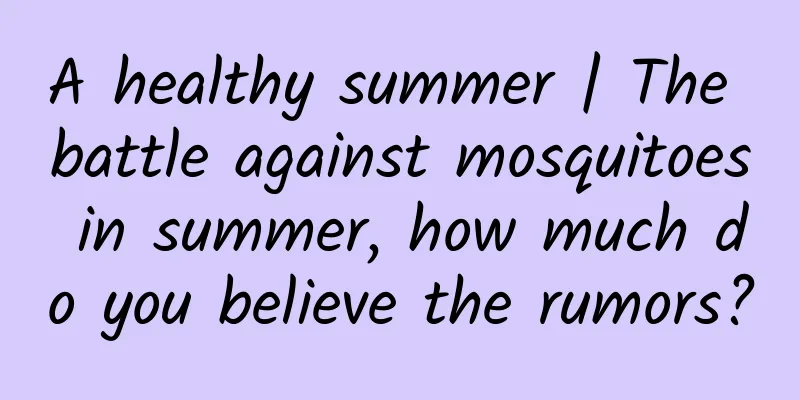A healthy summer | The battle against mosquitoes in summer, how much do you believe the rumors?

|
In the hot summer, in addition to the moonlight in the lotus pond and the sweet smell of fruits, there are also annoying mosquitoes. Common mosquitoes include mosquitoes, ticks, cockroaches, bedbugs, etc. There are many rumors about how to deal with mosquito bites. Today, Yaowa will help you identify them one by one. Rumor 1: Physical constitution can be determined by blood type, and people with a "mosquito-attracting constitution" are more likely to be bitten by mosquitoes. Truth interpretation: According to the Journal of Experimental Biology, mosquitoes are first attracted to the carbon dioxide exhaled by people, then fly in the direction of the smell, and finally land on the human body. Therefore, whether mosquitoes like to bite you or not has nothing to do with your blood type, and the "mosquito-attracting physique" no longer exists. But mosquitoes do have some preferences for who they attack, and they have a "heavy taste"! They like people with high body temperature, high lactic acid levels, and high carbon dioxide exhalation. People with strong fragrance (heavy makeup or excessive perfume) and strong odor are also particularly outstanding in the eyes of mosquitoes. These people should be careful in summer! Rumor 2: Mosquitoes are sensitive to smells, and using B vitamins can effectively repel them. Truth interpretation: Mosquitoes do not have sensitive olfactory cells like humans. They are just more sensitive to certain special chemicals such as carbon dioxide or special chemicals released by the sweat glands of the skin. Whether it is spraying B vitamins mixed with water or taking B vitamins orally, it has no effect on repelling mosquitoes. It should be noted that any or large amounts of oral B vitamins are health risks and should be taken according to doctor's advice. If you spray, mosquitoes don't matter, but don't scare your sweetheart away with the unpleasant smell! Rumor three: Mosquito repellent floral water contains pesticide ingredients and is highly toxic and can cause poisoning. Truth interpretation: The reason why mosquito repellent floral water can repel mosquitoes is that it contains an ingredient that mosquitoes can't avoid - DEET or dicedrine. According to my country's "Regulations on Pesticide Management" and other relevant regulations, any product used to prevent, repel or kill mosquitoes should be managed as a pesticide and must undergo efficacy and toxicity tests by national authorized departments to confirm that it is harmless to the human body and the environment and obtain a pesticide registration number before it can be put on the market. The pyrethroids, chlorpyrifos and DEET added to mosquito repellent floral water are indeed pesticide ingredients, but the content of these ingredients in regular brands of mosquito repellent floral water is within the safety standard range. Studies have shown that they are slightly toxic to the human body, and in the hot summer, mosquito repellent floral water will evaporate quickly and will not cause poisoning. Rumor 4: Safer and more effective, "natural plant mosquito repellent" is the first choice for children to repel mosquitoes. Truth interpretation: Common "natural plant repellents" include castor oil, citronella oil, rosemary oil, etc., but these products have a very short mosquito repellent effect, and the product ingredients contain many allergens and even herbal ingredients with unknown side effects. High concentrations may cause skin allergies in children. Rumor 5: Aloe vera has a wide range of uses, and applying fresh aloe vera juice can relieve itching after mosquito bites. Truth interpretation: Aloe vera is rich in nutrients such as amino acids, vitamins, enzymes, and has anti-inflammatory and bactericidal effects, so it also has a good therapeutic effect on mosquito bites. However, fresh aloe vera juice contains alkaloids, which can cause contact dermatitis in sensitive people. This can manifest as some inflammatory erythema on the skin, as well as papules, herpes and even blisters on the basis of erythema, accompanied by varying degrees of itching. Therefore, it is not recommended to apply untreated fresh aloe vera juice to mosquito bites! Rumor six: "Hormone face" is very scary, and you must never use hormones to treat mosquito bites on your face. Truth interpretation: Long-term and excessive use of hormone ointments on the face can indeed easily lead to hormone-dependent dermatitis, with symptoms such as bloodshot skin, thinning, pigmentation, increased hair growth, and acne. This is the "hormone face" that people are more worried about. If the mosquito bite is serious, and obvious skin inflammation, aggravated skin lesions, redness, swelling, blisters and other symptoms appear on the face, a small amount of glucocorticoid topical ointment such as budesonide cream, hydrocortisone butyrate cream, etc. can be applied to quickly relieve the symptoms. But do not abuse hormones for a long time, a small amount of topical application is still very safe! After being bitten by a mosquito, you can apply an appropriate amount of soapy water. Because the venom left by mosquitoes is generally acidic, using soapy water, an alkaline substance, can neutralize the acid and alkali, thereby playing a role in relieving itching and swelling. |
<<: 【Creative Cultivation Program】In fact, it is your stomach that controls your brain!
>>: Beware! Typhoon Mulan is approaching
Recommend
Carp: The oldest farmed fish in the world
When people mention carp, they will think of the ...
The war between Chinese internet companies spreads to Southeast Asia: The big battle is imminent
More and more Chinese Internet companies are begi...
8 common ways to leverage hot events for marketing
In an era where marketing is rampant, whoever cap...
Real KOC and fake traffic pool
Recently, everyone must have been flooded with a ...
How do Xiaohongshu, Zhihu, etc. acquire seed users?
Seed users refer to those who actively interact w...
Galaxy Internet TV is about to rise to become one of the three largest internet TVs in the world
At present, the seven Internet TV platforms that ...
Annual server rental bandwidth cost for short videos
In the era of selling goods by all, short videos ...
Which day's class will be made up on April 2, 2022? What day of the week was the class? Attached is the latest holiday schedule for Qingming Festival!
Soon, we will be welcoming the Qingming Festival ...
Can you play video games like this? Review of the KO Arcade Customized Boxing Fighter Joystick
With the rise of TV games and their growing devel...
Huawei and Xiaomi are involved in PC: Is there really no future for the PC industry?
Following Huawei's recent release of the Mate...
How is the fission activity of 12W PV achieved?
This case is a review of an online event planned ...
I drafted a book for my supervisor, but unexpectedly got a doctoral dissertation...
Some graduate students are not good at finding re...
Why are fruits becoming sweeter and sweeter? Is this unhealthy?
Have you noticed that fruits are getting sweeter ...
A large number of new iPhone activations encountered problems, Apple and carriers blamed each other
[[244587]] Recently, Apple's two new mobile p...
Can Google still make a living if it returns to the Chinese market?
Recently, there is news that Google has made a pr...









